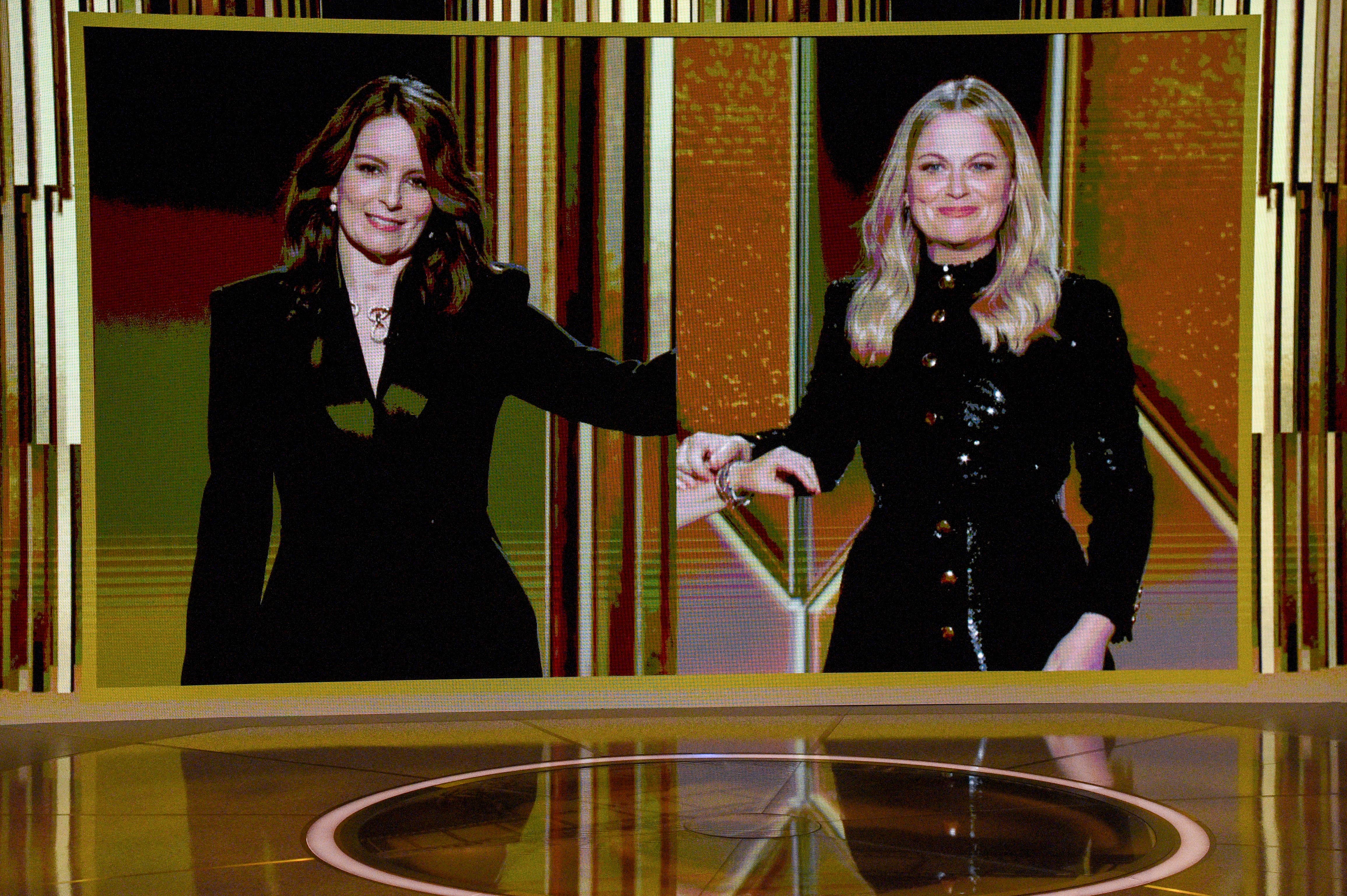
A promise for change is sometimes not enough—and the Hollywood Foreign Press Association needs to rectify their mistakes as soon as possible. The 78th Golden Globe Awards took place on Sunday, Feb. 28, a week after a revealing report by The Los Angeles Times shed light on the lack of Black representation within the HFPA. The award show’s entire mood seemed to revolve around the HFPA’s failure to have an inclusive and diverse membership and voting body. The group, which consists of 87 members, currently doesn’t have any Black journalists onboard. Naturally, the revelation had Hollywood and entertainment fans in dismay.
The backlash inspired a new movement, #TimesUpGlobes, created by the Time’s Up organization with the tag line, “A cosmetic fix isn’t enough.” Stars like Kerry Washington, Jennifer Aniston, Shonda Rhimes, Ellen Pompeo, Ava DuVernay, Judd Apatow, and others, showed their support, calling out the HFPA ahead of the awards show. The report was published on Feb. 21, which gave writers and producers plenty of time to find a way to address the controversy during the live show adequately. Instead, much of that responsibility was placed on the show’s hosts, Tina Fey and Amy Poehler, but they sort of fell flat.
The pair halfheartedly called out the association during their monologue, making lukewarm jokes about a situation that truly isn’t funny at all. The 30 Rock alum started by saying the HFPA is made up of “about 90 non-Black journalists” and made a joke about her movie, Pixar’s Soul, where a Black character’s soul gets put into a cat—a heavily criticized aspect of the animated film. “The HFPA really responded to the movie because they do have five cat members,” she quipped. Toward the end of their monologue, the pair attempted to tackle the controversy, with Poehler saying that “a number of Black actors and Black-led projects were overlooked” due to the lack of voter diversity. “Look, we all know that award shows are stupid. The point is even with stupid things, inclusivity is important. There are no Black members of the Hollywood Foreign Press,” Fey added. “I realize HFPA, maybe you guys didn’t get the memo because your workplace is the back booth of a French McDonald’s, but you got to change that. So here’s to changing it.” Poehler added: “Yes, I’m looking forward to that change.” And that was it.
Other celebrities in attendance spoke up during the ceremony in their own ways. Daniel Levy used his acceptance speech to share a message on inclusivity. “In the spirit of inclusion, I hope that next year, this ceremony reflects the true diversity of the television and film industry,” the Schitt’s Creek star said. This Is Us actors Sterling K. Brown and Susan Kelechi Watson took the stage to present and said, “It’s great to be Black at the Golden Globes, I mean, back.”
Jane Fonda eloquently urged people in the industry to open their hearts to new stories and new perspectives. “There’s a story we’ve been afraid to see and hear about ourselves in this industry. A story about which voices we respect and elevate—and which we tune out,” the legendary actress said while accepting the Cecil B. DeMille Award. “A story about who’s offered a seat at the table and who is kept out of the rooms where decisions are made. So let’s all of us—including all the groups that decide who gets hired and what gets made and who wins awards—let all of us make an effort to expand that tent. So that everyone rises and everyone’s story has a chance to be seen and heard.”
During the pre-show, the HFPA announced they would be addressing the diversity issue during the broadcast. “On behalf of the Hollywood Foreign Press Association, thank you for joining us tonight to celebrate the work of artists from around the globe, we recognize we have our own work to do. Just like in film and television, Black representation is vital. We must have Black journalists in our organization,” HFPA Vice President Helen Hoehne said. Former President Meher Tatna added: “We must also ensure everyone from all underrepresented communities gets a seat at our table, and we are going to make that happen.” HFPA President Ali Sar continued, “That means creating an environment where a diverse membership is the norm, not the exception. Thank you, and we look forward to a more inclusive future.”
The show began on a high note when Daniel Kaluuya won the award for Best Performance by an Actor in a Supporting Role in a Motion Picture for his role in Judas and the Black Messiah. Kaluuya ended his acceptance speech, which was almost botched due to technical difficulties, by thanking his inspiration Fred Hampton, a leader of the Black Panther Party. John Boyega took home the second award of the night in the Best Performance by an Actor in a Television Supporting Role category for his role in Small Axe. Later on in the night, Andra Day became the second Black winner of the Best Actress in a Motion Picture for her role inThe United States vs. Billie Holiday. While all those wins should be celebrated and are a step in the right direction, some other films and actors deserved to be nominated as well. The association’s lack of diversity was evident when they announced the nominations and some of the best Black-led projects of the past year were snubbed. Michaela Coel’s acclaimed HBO-BBC series I May Destroy Youwas ignored in all categories, and films like Spike Lee’s Da 5 Bloods, One Night in Miami, and Ma Rainey’s Black Bottom were left out of the best picture category. Zendaya’s powerhouse performance in Malcolm & Marie didn’t receive the recognition people expected. If any Black journalists were part of the voting body, would the categories have looked different in 2021?
The Hollywood Foreign Press Association also released a statement last week vowing to bring in new members. “We are fully committed to ensuring our membership is reflective of the communities around the world who love film, TV, and the artists inspiring and educating them,” it read. “We understand that we need to bring in Black members as well as members from other underrepresented backgrounds, and we will immediately work to implement an action plan to achieve these goals as soon as possible.” But becoming a member is not easy, and the qualifications are rather specific. The Golden Globes website has listed the criteria for what they are looking for and it’s a lot. The applicant should be based in Southern California, covering the entertainment industry for a legitimate international publication, and must be sponsored by two current HFPA members. They also have to submit 24 sample clippings of their work from the last three years and must be listed in the Motion Picture Association of America directory of journalists for the past two years. The HFPA is reportedly also considering amending its rules to help widen its applicant pool.
Tatna, who is still a board chair, revealed last week that the organization hadn’t had a Black member since 2002 when she joined. That’s at least 20 years without Black representation in the voting body. “As a person of color, it’s important to me,” Tatna, who is from India, told Variety following the report. “It’s just there are nuances, as an organization of immigrants, who write for our home country, that search [for international Black journalists] has not been easy, but that doesn’t mean we will give up. We will keep trying, and we will be part of the solution.” When asked about the identity of the last Black member, Tatna said: “It was before my time, but I don’t remember what country he came from.” An HFPA spokesperson told Variety that the journalist was from Belize but didn’t share when he was a member. The association previously came under fire in 2013 when it denied membership to a Black applicant named Samantha Ofole-Prince saying she was “unqualified” when she was.
Based on that, perhaps it’s also time to review the wins and nominations of the past 20 years and see things from a different perspective. Were there movies that went unnoticed because there was no Black representation? How many Black actors, directors, and creators have been overlooked because of the lack of diversity within the HFPA? How many deserving people went home empty-handed and deflated just because the association didn’t bother to invite or accept any Black journalists to join them? If things were equal and diverse, would I May Destroy Youhave received just as many nominations as Promising Young Womanreceived this year, if not more?
Black creators already have to fight so many battles to make art that represents their culture and amplifies their voices. But what is the use in all that if the people in charge of awarding their work can’t fully relate to or understand the art they are creating? Some people make films and television shows for the pure love of the craft, not the trophies, but they also deserve acknowledgment and recognition. It doesn’t matter that there are more women than men on the board if the women aren’t even open-minded enough to attend a free screening of a movie made by a Black director. It’s often difficult for people to relate or feel any connection to people who don’t look like them, and that’s why representation on and off-screen is essential—it matters in every industry.
It is not enough for the HFPA to get onstage and just say things will change—at this point, people need and deserve proof. A week was more than enough time for new changes to have been enacted or for a plan to be put in place. There are plenty of qualified Black journalists that are deserving of a membership invitation. Instead of an apology and a promise of change, they could have shared names of people they will invite, or provided a percentage or a number of new members to be added in the coming year. Anything quantifiable would have worked. The actors and creators from the past 20 years deserve some sort of justice, and a detailed plan of action could have helped make people more comfortable and more willing to accept the apology. The hope is that more Black journalists will be added to the voting committee of the Hollywood Foreign Press Association in the next year. Despite Tatna saying how difficult it has been to find quality Black candidates, chances are they already have a stack of applications from people who are overqualified on their desks that they can revisit. It’s also time for each of those 87 members to do their due diligence and start reaching out to Black journalists and inviting them in. As Spike Lee said, the Hollywood Foreign Press must diversify their membership for the Golden Globes to stay relevant. The world is watching, HFPA. It’s time to do more and the time to do it is now.



